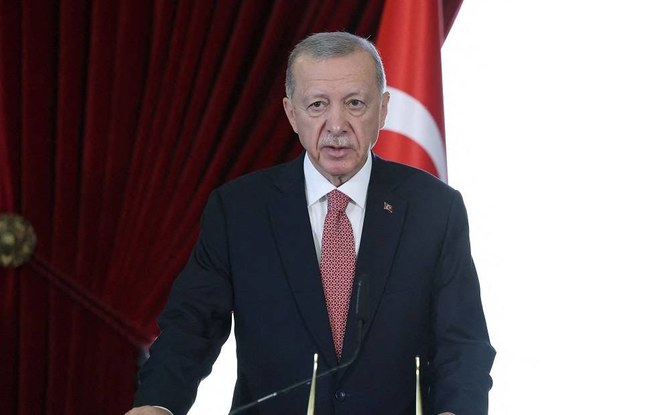Sinem Cengiz
Turkiye, Egypt, and Saudi Arabia have held significant meetings in the past few weeks on issues that pose threats to their interests and to the stability of the region. While all eyes were fixed on the Ukraine-Russia war and the peace summit in Jeddah, two crucial meetings took place in Ankara and Cairo with the aim ofrestoring Palestinian unity.
On July 26, Turkish President Recep Tayyip Erdogan hosted Palestinian President Mahmoud Abbas and Hamas leader Ismail Haniyeh at the presidential palace. The talks took place behind closed doors, and no details were made public. In late July, senior figures from the Palestinian factions met in Cairo to discuss Palestinian national unity and a comprehensive vision toward the Israeli-Palestinian conflict.
The last time the leaders of Fatah and Hamas met publicly was in June 2022 in Algeria during that country’s Independence Day celebrations, their first encounter in more than five years. The meeting in Egypt was part of an attempt to find common ground between the rival Palestinian groups, but it is viewed as another failure— just like more than dozens of similar attempts since 2007, including the talks in In Algeria. The main disagreement between the two leaders is over the strategy for achieving their common purpose for Palestinians, and their rivalry for power. Both are engaged in a struggle to win the hearts and minds of not only the Palestinians, but also regional states.
Unity among Palestinian entities and a balance between Palestine and Israel requires a delicate balancing act, fine diplomacy and cooperation from regional countries. Palestine represents significant common ground for Turkiye and Egypt, two regional states that have reconciled after decade-long tension in relations. Ankara and Cairo consider the Palestinian issue and the resolution of the Palestine-Israeli conflict to be a shared objective and a common vision for regional stability. Although Palestine has occasionally been an area of competition for regional influence between Ankara and Cairo, especially at times of antagonism between them, it also represents the most important aspects of their regional cooperation.
It is not only Palestinians who are frustrated with the lack of political progress and the failure to establish national unity; regional states such as Turkiye are trying to carve out a role for themselves as mediators between rival Palestinian groups, and are uneasy over the continuing rift that benefits no one but only Israel.
In the delicate balancing act between Palestinian groups and Israel, Ankara has even rejected Tel Aviv’s request to deport Hamas leaders living in Turkiye, despite the restoration of diplomatic ties between the countries. Israeli officials have been insisting on this since 2020, and the latest demand came when Defense Minister Benny Gantz visited Turkiye in October. Ankara has repeatedly stated that it does not consider Hamas to be a terrorist group, and would not expel its members from Turkiye. Moreover, Ankara suggested that it aimed to lead efforts to unify Hamas with Fatah, rather than exclude the former from the process. In the early 2000s, Turkiye initiated the Ankara Forum as a confidence-building mechanism between Palestine and Israel.
A day after Abbas’s meeting with Erdogan and Haniyeh in Ankara, Benjamin Netanyahu was due to travel to Turkiye in the first visit to Ankara by an Israeli prime minister since 2008. The trip was postponed after he underwent surgery to implant a cardiac pacemaker, and Israel remains roiled by protests over contentious judicial reforms. It is still not clear if or when the visit will take place, but if it does it is likely to consolidate Turkish-Israeli normalization, which is viewed by Ankara as a positive development in serving the Palestinian cause.
Unlike Fatah, Hamas spoke out against the Ankara-Tel Aviv rapprochement and was uneasy about Ankara’s statement that Palestinian parties were in favor of it. In contrast, a few days after Turkiye and Israel said they would restore full diplomatic relations and reappoint ambassadors for the first time since 2018, Abbas paid a visit to Ankara that signaled Fatah’s positive stance towards the normalization.
Praising the Turkish leadership’s efforts to unite Palestinian groups, Abbas has even said the Palestinians will name a square in Ramallah after Erdogan “in appreciation of his big and important role” in supporting the Palestinians, who pin hopes on him to heal the Palestinian internal rift. There are hopes that normalization of ties between Ankara and Tel Aviv will push the former to play a bigger mediation role between Hamas and Israel — similar to that of Egypt and Qatar — on many issues, most notably prisoner swaps and economic incentives for people in the Gaza Strip. It could also ease potential future tension that could lead to a new military escalation between Israel and Hamas.
With the current momentum, Ankara is likely to keep its relations balanced with the parties to the Palestinian-Israeli conflict, while also balancing between Fatah and Hamas. Ankara continues to insist on the two-state solution, while it is progressing in relations with Israel at the same time on several issues, economic, energy and political.







